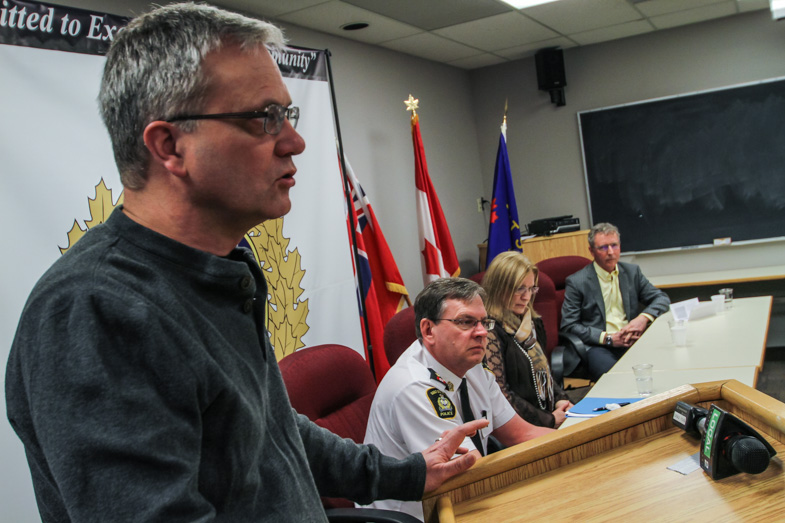
Today at the Police Services Building, the Sault Ste. Marie and Area Drug Misuse Strategy Committee announced the official launch of our own Fentanyl Patch 4 Patch Exchange Program which requires patients with valid prescriptions to return used fentanyl patches to their pharmacist before new ones are dispensed.
"Fentanyl and opiates are in the top five drugs that are being reported in our program," Sandy Byrne, program manager for Algoma Public Health's Community Alcohol Drug Program, told SooToday. "In the Algoma County, opiate use is about three percent above the provincial average of people who have been calling the drug helpline. About a quarter of the people who had any entry into the LHIN-funded treatment program, including the counselling program in the Northeast region, were reporting problematic presenting issues with opiates."
In October of last year, Nipissing MPP Vic Fedeli introduced a private members bill that would reduce prescription drug misuse across the province.
Bill 33, Safeguarding our Communities Act (Fentanyl Patch for Patch Return Policy), 2014, is modelled after a program first implemented in Fedeli's riding by the North Bay and Area Community Drug Strategy Committee in December 2013.
The initiative was in response to the marked increase in criminal activity, addiction issues and incidents of overdose associated with misuse of fentanyl transdermal patches.
This trend is cause for concern not only in North Bay, but other communities across Northern Ontario including Sault Ste. Marie and the Algoma region.
Typically prescribed to those suffering severe and chronic pain, fentanyl is a synthetic opiate 100 times stronger than morphine and 40 times stronger than heroin.
It's the drug's potency and wide availability that makes it attractive in illegal markets, and discarded patches contain significant amounts of fentanyl even when used as prescribed - enough to cause an overdose.
"The street value of new patches is between $400 and $500 per patch, and used patches is around $150," said Byrne. "We do know there is illegal distribution and abuse in the community, and we now have evidence that fentanyl patch return programs are necessary to decrease illegal distribution and have proven to be effective in Ontario and other communities."
Joining Byrne at today's announcement were representatives from other area agencies involved in the collaborative drug prevention initiative, including Police Chief Robert Keetch, Superior Family Health Team Lead Physician Dr. Alan McLean, and Pharmacist Jon MacDonald.
Although spearheaded locally by Algoma Public Health, the majority of the responsibility of ensuring the success of the Fentanyl Patch 4 Patch Exchange Program will fall on the physicians, pharmacists and patients.
It's the role of the pharmacist to educate the public, monitor for forged prescriptions, and properly dispose of returned patches, MacDonald told media.
Dr. McLean expressed excitement over the collaboration and the opportunity to improve communication among participating agencies, other physicians, pharmacists and patients.
"This is an important problem and I think the underlying theme of this is it's a problem that we have a shared responsibility for," he said. "We all have a role to play. Fentanyl can be a dangerous drug when misused. It can also be a valuable drug in terms of treating pain in a number of situations."
He noted, however, that individuals who need fentanyl for chronic pain maintenance are often vulnerable and easily victimized.
Situations occur where nursing home residents and hospital patients have their fentanyl patches removed for illegal distribution on the street, a trend he finds disturbing.
Constable Darin Rossetto of the Neighbourhood Resource Centre said many of these victims don't come forward for fear of exposing a friend or loved one.
But he added that "having a strategy and having doctors, pharmacists, the Police, and Algoma Public Health on board working to prevent this in the future will work towards preventing such misuse and abuse."
While Bill 33, Safeguarding our Communities Act (Fentanyl Patch for Patch Return Policy), 2014 has only passed a first reading, a number of other communities in addition to North Bay and Sault Ste. Marie have adopted patch exchange programs, including Wawa, Dubreuilville, Durham, Guelph and Peterborough.
The Greater Sudbury Region is also reportedly looking to implement a similar prevention initiative.
(PHOTO: Dr. Alan McLean delivers remarks during the Fentanyl Patch 4 Patch Exchange Program announcement at the Sault Ste. Marie Police Services Building on Tuesday, February 24, 2015. Donna Hopper/SooToday)
Additional SooToday coverage of this story